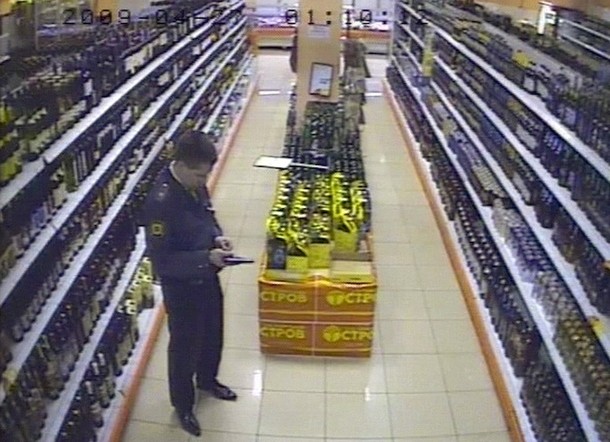
Police Supermarket Killings in Moscow Reveals Deeper Problems
Publication: Eurasia Daily Monitor Volume: 6 Issue: 92
By:

On April 27, Police Major Denis Yevsyukov, chief of the Tsaritsino district precinct in Southern Moscow, opened fire in a supermarket, killing two and injuring six -with four critically injured (www.publicverdict.org, April 27). The major also shot dead the taxi driver who had driven him to the store. What the authorities hastened to present as an act of random brutality on the part of a deranged individual, in reality represents a much deeper institutional problem within the police. Whereas most citizens in a Western country feel either indifferent or protected when they meet police on their streets, in Russia the same meeting evokes fear.
All law-enforcement services within Russia have become a public menace, but the Ministry of the Interior (MVD), which runs the police force, standing apart as being the most notorious. Policemen have become infamous for beatings, extortions, rape and robbery.
One indication of how the interior ministry became criminalized was revealed in the case of Lieutenant-General Alexander Orlov. Formally acting as an aide to the then Interior Minister Vladimir Rushailo, Orlov in effect ruled the MVD between 1998 to November 2001 -after which Rushailo left to take over the Security Council. Orlov, whose personal fortune was estimated at some $100 million, immediately disappeared. Though the authorities placed him on a wanted list, he conspicuously visited Moscow restaurants and Rushailo’s son’s dacha (www.warweb.ru, May 8, 2005).
On the same day that Major Yevsyukov went on his shooting spree, prosecutors accused five Moscow police officers of operating as a criminal gang. The accused officers served in the police organized crime squad. They have been charged with kidnapping a Tajik citizen to extort money from his relatives, before allegedly beating him to death. The officers also face charges of selling drugs and forging criminal evidence (The Times, April 28).
Indeed, law-enforcement officers being transformed into a criminal gang are nothing new. The most notorious (though far from unusual) case, known as "the case of uniformed werewolves" was publicly exposed in 2003. Six senior officers from the Moscow Criminal Investigation Deprtment, much romanticized over decades as the service of dedicated crime-busting role-models without fear or reproach, were charged with organizing a criminal group, extortion, fraud, racketeering, and beatings among other things. Lieutenant-General Vladimir Ganeyev, the chief of the Ministry for Emergencies’ internal security department (the Russian version of FEMA) headed this "werewolf group" (www.utro.ru, July 2, 2003). Four more officers from the same department were arrested as members of this criminal group in 2007 (Moskovsky Komsomolets, June 14, 2007). According to numerous testimonies, published by the respected human rights Public Verdict Foundation and other rights groups, beatings remain the main investigative modus operandi at Russian police precincts.
In 2005, complaints against police abuse accounted for 30 percent of the total filed with the Russian ombudsman office (www.rbcdaily.ru, February 28, 2005). This has since markedly deteriorated. On May 6, ITAR-TASS quoted an officer from the MVD Internal Security Department as saying that it had exposed around 18,000 criminal offences, committed by the police in the first quarter of 2009. "This is an 18 percent increase from last year’s similar indicator," the officer told ITAR-TASS.
Altogether, according to the officer the department had exposed 89,000 offences by the police and the migration service. He emphasized that the number of police officers brought to justice for criminal offenses, has grown over the past four years. However, many other cases of police violence remain unregistered or ignored by the authorities.
In December 2008 an elite riot police squad (OMON) in the Republic of Bashkiria went on the rampage, assaulting locals in the cities of Blagoveshchenk, Salavat, Chishmy and some nearby villages. According to the media and human rights activists, in Blagoveshchenk alone up to 1,500 males (2.5 percent of the entire population) were detained and brutally beaten. Officials indicated that 342 were detained, with 197 registered as seriously injured by beatings. The Moscow-based bi-weekly Novaya Gazeta alleged that the riot police had carried out mass rape. "I have seen a lot, but I wept as I listened to this tape," commented Novaya Gazeta’s correspondent Marat Hairullin, as he quoted testimony from a rape victim: "There were three of us…He was wearing a mask…They said either this, or you will be charged with crime…they made me lie on a desk…It really hurt…" (Novaya Gazeta, January 14, 2005).
The MVD explained the police action by the need to rein in criminal elements who attacked a police patrol on December 8, 2004 in Blagoveshschensk. However, the MVD flatly dismissed all charges of rape. On April 28, in the wake of the Major Yevsyukov case, the Minister of the Interior General Rashid Nurgaliyev vowed to purge the police from "those who besmirch the rank of a police officer (Izvestia, April 29).
As if in mockery of his statement, on the morning of May 6, Moscow traffic police had to use road spikes and allegedly fire in the air in order to detain a drunken police officer after a long chase through the capital. The drunken driver was speeding on the wrong side of the road and also used pedestrian sidewalks during the pursuit (www.gazeta.ru, May 6).
On May 7, another Police Major was detained in Moscow as he tried to extort $200,000 from a private business in return for closing an investigation into the company and returning its impounded computers and office documents (www.grani.ru, May 7). One exasperated gazeta.ru reader commented: "The entire MVD ought to be disbanded" (www.gazeta.ru, May 6). However true, that remains only wishful thinking. No purge will put an end to the institutionalized police abuse within Russia.




